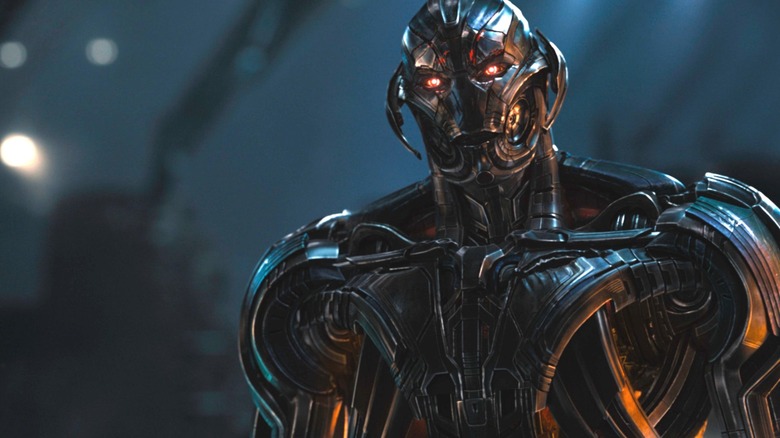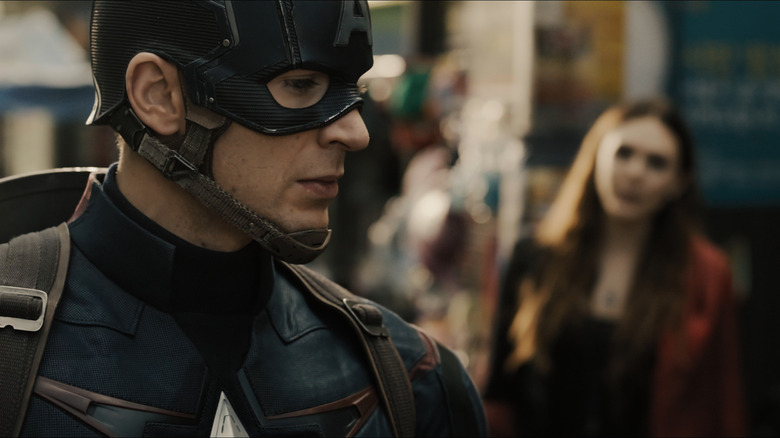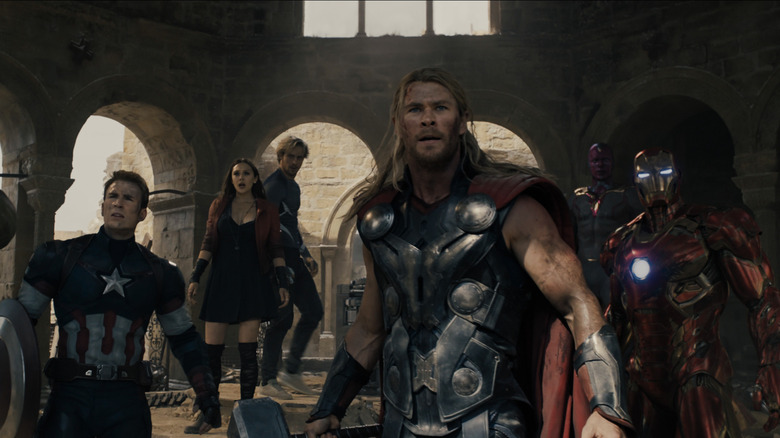Why Avengers: Age Of Ultron Pushed Joss Whedon Away From Making Marvel Movies
"Avengers: Age of Ultron" is an interesting film in the "Infinity Saga" of the Marvel Cinematic Universe — but more for its history than the movie itself. Its highly successful predecessor, "The Avengers," set a new precedent for comic-book movies in 2012 and kicked off a wave of countless attempts from other studios to create interconnected universes. Anticipation was at an all-time high for the next big MCU team-up. Returning from the first film was writer and director Joss Whedon, who had announced at Comic-Con 2013 that the next "Avengers" film would have Ultron as the villain. Whedon had set the stage to create the darker second chapter of the "Avengers" series of films.
Unfortunately, following up on a film as impactful as "The Avengers" would prove to be a stressful experience for Whedon. The director set out to make the sequel a more intimate affair than the previous entry; however, he had to contend with the weight of introducing new characters and setting up each Avenger's arc for their subsequent films in Phase 3 of the MCU. The result would be a mixed bag: While "Avengers: Age of Ultron" would introduce exciting ideas and have an outstanding performance from James Spader as the titular villain, the film struggled to balance everything it was trying to introduce.
'I was so beaten down by the process'
In an interview with Variety in 2016, a year after "Age of Ultron" had come out, Whedon opened up about how draining the process of making the movie was. Whedon would state that he "was so beaten down by the process. Some of that was conflicting with Marvel, which is inevitable. A lot of it was about my own work, and I was also exhausted."
Whedon wasn't the only director to clash with Marvel Studios (nor would he be the last). Patty Jenkins stepped away from directing duties for "Thor: The Dark World" and Edgar Wright walked away from "Ant-Man," a film that the Cornetto Trilogy director had been involved with for eight years, on and off (per Variety). At the time, the studio's distinct vision for their overarching narrative would prove to be too much of a creative impediment for some filmmakers.
As difficult as it was for Whedon to make the film, the director looks back at the experience fondly, despite everything he sees as "wrong" with the "Avengers" sequel:
"I am very proud of it. The things about it that are wrong frustrate me enormously, and I probably had more of those than I had in the other movies I made. But I also got to make, for the second time, an absurdly personal movie that talked about how I felt about humanity and what it means, in very esoteric and bizarre ways, for hundreds of billions of dollars."
The future of Marvel Studios
Underneath all the setting up of "Civil War," "Ragnarok," and "Infinity War" in "Avengers: Age of Ultron," there's an engaging film that uses its colorful cast of characters to wax philosophical. The themes of evolution, religion, and identity — explored through having the Avengers face a darker version of themselves — make this "Avengers" sequel conceptually exciting. Held back by its need to set up what's to come and to adhere to the rules of an interconnected universe, "Age of Ultron" was a foreboding sign of the struggles future MCU films would face.
As the Marvel Cinematic Universe only continues to grow and shows no signs of slowing down, Whedon's comments from 2016 feel more relevant now than ever. Despite the massive budgets ("Age of Ultron" is still the most expensive "Avengers" film) and narrative weight of 30-plus films, the MCU can still serve as an outlet for directors and writers to tell deeply personal stories. Suppose the studio finds a way to partner a director's unique vision with the ambitious needs of a cinematic universe. In that case, there may be hope yet for Marvel Studios to remain creatively fresh and continue to tell exciting stories.


